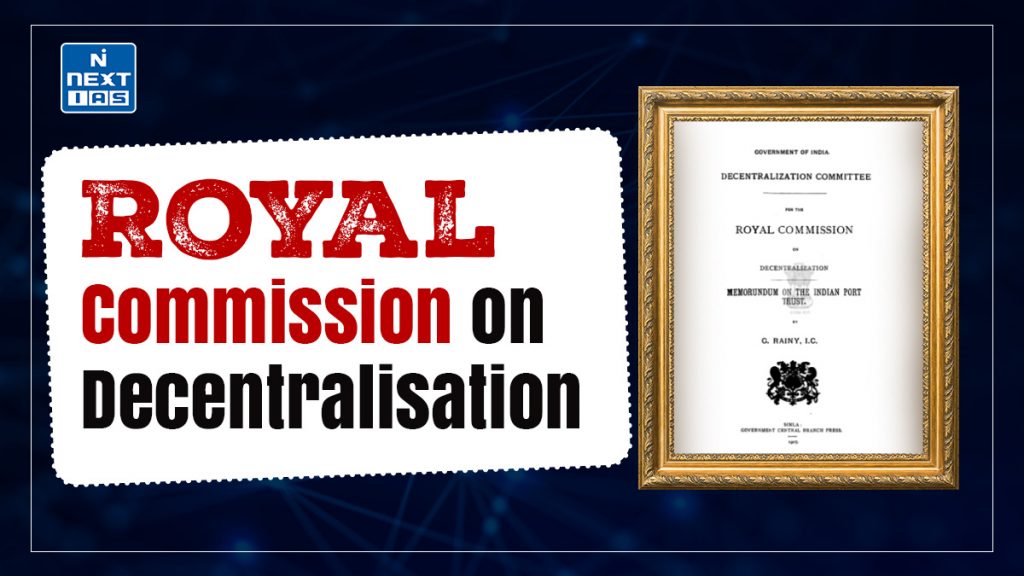
The Royal Commission on Decentralisation (1907-1909) was established to examine the excessive centralisation in British India’s governance and recommend measures to empower local authorities. Its recommendations highlighted the need for administrative and financial autonomy at the regional level, aiming to improve governance efficiency across rural and urban areas. This article aims to detail the commission’s key recommendations, their intended impact on governance, and the extent of their implementation in British India.
About Royal Commission on Decentralisation (RCD)
- The Royal Commission on Decentralisation in India (1907-1909) was established in response to increasing centralisation, particularly in financial and administrative matters within the British Indian administration.
- The government recognised that excessive centralisation was hampering effective governance and local administration, necessitating an exploration into decentralising authority.
- The Royal Commission on Decentralisation, a six-member body chaired by Sir Henry William Primrose, examined the relationship between the Government of India and the provincial governments and between the provincial governments and their subordinate authorities.
- The primary goal was to assess the distribution of powers and recommend measures to relax centralised control and streamline administrative methods.
Findings of Royal Commission on Decentralisation
- The Royal Commission on Decentralisation’s report underscored financial resource deficiencies as the primary obstacle to efficient local administration.
- It identified the inadequate funding for local bodies as a serious impediment to their functioning.
- The Royal Commission on Decentralisation further acknowledged that greater administrative autonomy at the local level would require adequate financial resources, enabling these bodies to fulfil their responsibilities effectively.
Recommendations for Village Panchayats
- The Royal Commission placed significant emphasis on empowering Village Panchayats and Sub-District Boards.
- The Royal Commission on Decentralisation recognised that Village Panchayats were central to rural administration and suggested they be entrusted with greater authority in several areas to enhance their role. Among the powers recommended for Village Panchayats were:
- Summary jurisdiction over petty civil and criminal cases: Empowering Village Panchayats to handle minor cases would relieve the district courts and allow quicker resolutions.
- Management of village expenditures on sanitation and maintenance included village cleaning and minor infrastructure works, fostering self-reliance in handling local needs.
- Construction and supervision of village schools: By placing educational infrastructure under local control, the commission aimed to make Village Panchayats active participants in the administration of primary education.
- Management of small reserves for fuel and fodder: The Panchayats were advised to maintain reserves, ensuring the community’s needs for basic resources were met efficiently.
Recommendations for Sub-District Boards
- The Royal Commission on Decentralisation also highlighted the importance of Sub-District Boards and advocated for their establishment in every taluka or tehsil.
- These boards were recommended as primary authorities for rural board administration, providing an intermediary governance structure that could operate between the district and village levels.
- The Sub-District Boards were expected to play a crucial role in rural governance by overseeing various administrative functions and ensuring the efficient delivery of services at the grassroots level.
Recommendations for Municipalities
- Regarding municipal governance, the Royal Commission proposed removing existing restrictions on the municipalities’ authority to levy taxes.
- It further recommended that municipalities receive regular grants-in-aid from regional governments, enabling them to undertake responsibilities without heavy central interference.
- For larger projects, such as water supply and drainage systems, the commission suggested that the provincial government provide direct assistance, allowing municipalities to concentrate their resources on other essential services.
- Additionally, municipalities were encouraged to assume responsibility for primary education and, if possible, middle vernacular schooling.
- The commission argued that municipalities should be relieved of other responsibilities such as secondary education, hospitals, relief works, police, famine response, and veterinary care so they could focus on primary local concerns.
Government of India Resolution of 1915
- In 1915, the Government of India issued a resolution reflecting its official stance on the recommendations of the Decentralisation Commission.
- While this resolution acknowledged the importance of decentralizing administrative powers, most recommendations remained unimplemented, leaving the status of local governance essentially unchanged from the reforms initiated under Lord Ripon.
- Despite the Royal Commission on Decentralisation’s advocacy for decentralisation, meaningful changes to the autonomy and authority of local bodies were limited, leaving the centralised administrative structure intact.
Conclusion
The Royal Commission on Decentralisation (RCD) thus represented a crucial attempt to rethink governance in colonial India. The commission highlighted administrative efficiency and community participation issues by examining the limits of central authority and the need for empowered local bodies. However, the lack of implementation of its recommendations underscored the British administration’s hesitancy to relinquish control. This stance limited the development of self-governing institutions in India until later reform efforts.
GS - 1





